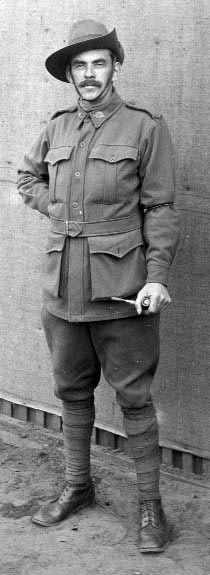My Grandfather (Pop), Robert Ralph Abercromby, served as a private (#2660) in “D” Company, 44th Battalion, in the 3rd Division of the Australian Imperial Force (AIF) in World War 1. (on some Nominal Rolls he is recorded as R.R. Abercrombie).
Fortunately he kept a diary of his experiences in France and Belgium during the War.
Military records obtained from the Australian Archives show he enlisted in Fremantle, Western Australia, on the 28th June 1916 at the age of 33 and 11 months.
Robert Abercromby enlisted with his younger brother-in-law; Albert Helliwell (#2661). They both followed Albert’s older brother Roby Helliwell (#585) into the 44th Battalion.
After initial training, Robert Abercromby embarked for England on the 9th November and arrived in Devonport on the 10th January 1917.
His Battalion was shipped to France on the 25th April 1917 and he was wounded in action during the fighting on Messines Ridge on the 10th June 1917.
After treatment in France and England, he was declared “Return to Australia” and left England on 28th September 1917, finally being discharged in Fremantle on 13th March 1918. Some would say he was lucky.
I was five when Pop died in 1963, so I only have childhood memories of him. Dad (Robert Bruce Abercromby, known as Bruce) was born in 1932, the youngest of seven children, when his father was 50. So when I came on the scene in 1958, Pop was 76. I remember his walking stick and the little toy dog he kept under his seat, which mysteriously ran back and forward and barked when I walked past, the house Nana and Pop lived in, in Shenton Road, Claremont, Western Australia and other vague recollections.
As I grew up I obviously learnt that he had fought in World War 1 and in recent years I obtained a copy of his military records and diary from my Auntie Jean (McDonald). This information kindled my desire to follow Pop’s footsteps and in some small way experience where he had been.

